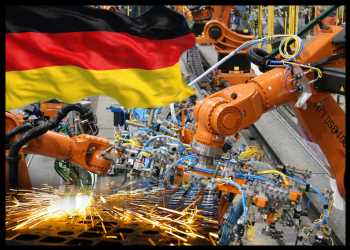Will Germany Avoid A Recession On Industrial Resilience?

Germany industrial production dropped only slightly in October despite the sharp weakness in energy-intensive sectors, signaling a less severe economic downturn at the end of the year.
Industrial production dropped 0.1 percent on a monthly basis in October, slower than the expected fall of 0.6 percent. Nonetheless, the fall was in contrast to the revised 1.1 percent increase seen in September, data from Destatis showed Wednesday.
Data released on Tuesday showed that factory orders rebounded 0.8 percent in October, Underpinned by foreign demand, orders grew in contrast to the revised 2.9 percent decrease in September.
Excluding energy and construction, industrial output decreased 0.4 percent, but gained 0.8 percent from the last year.
Within industry, capital goods output grew 1.4 percent, while production of consumer goods and intermediate goods fell 1.9 percent and 1.8 percent, respectively.
Output of energy-intensive sectors decreased 3.6 percent on month.
Energy production shrank 7.6 percent. On the other hand, construction output grew 4.2 percent in October.
Compared to October 2021, industrial production was unchanged, after a 3.1 percent rise in September.
The resilience in production was driven partly by a recovery in construction which tends to be volatile, Franziska Palmas, Capital Economics’ economist said.
The economist expects high energy costs, rising interest rates and cooling demand to cause industrial output to fall further in the coming months, albeit less sharply than previously anticipated.
After today’s data, it has become even more likely that the German economy will not contract in the fourth quarter either despite the burden of massively higher energy prices, Commerzbank said. But this might change in the first half of the year.
In the third quarter, the largest euro area economy had expanded 0.4 percent. Despite a resilient industry, several economists widely expect the economy to enter a mild recession in the winter.
Source: Read Full Article
